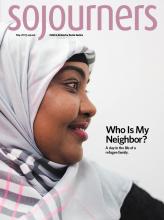PRIOR TO THE ELECTION, I read J.D. Vance’s best-selling memoir, Hillbilly Elegy, in an attempt to understand Trump’s appeal to lower-income white Americans. However, this didn’t prepare me for the 81 percent of white evangelical Christians, some of them my extended family members, who cast their ballots for, it seemed to me, religious intolerance, misogynistic policies, environmental neglect, and white privilege. On Nov. 9, 2016, I awoke to find not just a world divided between Democrats and Republicans, but two versions of Christianity at odds with one another. Clearly, I had missed something.
Once initial shock over the election results subsided, I began purchasing books—stockpiling them. Perhaps I could build a wall of literature for protection, one of those enormous noise barriers separating residential neighborhoods from freeways, something to block out the racism and bigotry I assumed were behind the election results. What did theologians have to say about these topics? How had previous generations faced authoritarian threats? I searched progressive Christian reading lists: Howard Thurman’s Jesus and the Disinherited, Drew G.I. Hart’s Trouble I’ve Seen, Dietrich Bonhoeffer’s The Cost of Discipleship ... The list grew. I couldn’t stop. Amassing these titles and stacking them higher made me feel righteous. I began referring to them as my “resistance library.”
Existing titles from my bookshelves joined new acquisitions to form adjoining soundproof panels. Some portray a radically different God from the one with whom I grew up: Marcus J. Borg’s Meeting Jesus Again for the First Time, Walter Brueggemann’s The Prophetic Imagination, and Scott W. Gustafson’s Behind Good and Evil. Rachel Held Evans’s memoir, Faith Unraveled, details how she moved away from fundamentalism. Her faith journey mirrors parts of my own. After further rearranging within my bookcases, I erected another section dedicated to world religions. God Is Not One, Stephen Prothero’s book on eight world religions, sat next to Reza Aslan’s primer on Islam, No god but God, and the biography Mormon Enigma: Emma Hale Smith.
Read the Full Article

